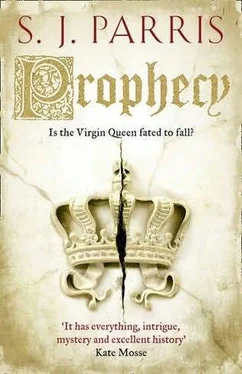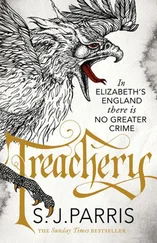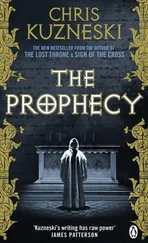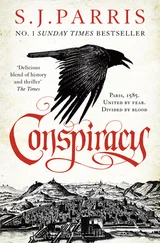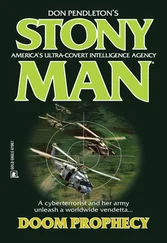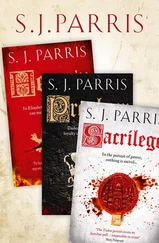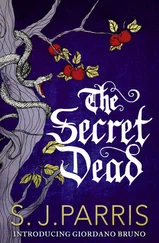‘Then you think this war inevitable, my lord?’ I rub my brow with my thumb, confused. ‘In that case, why argue against it?’
‘No. I think the reassertion of Catholic supremacy inevitable,’ he says, his face stern. ‘King Henri has given too much freedom to the Protestants in Paris, and I do not think he can resist the rise of the Duke of Guise. But perhaps both sovereigns can be persuaded to submit to the Catholic powers without war. That is my hope. So you see my difficulty, Bruno. I must not appear too firmly set against this invasion, in case Guise gains power in Paris. But neither must I commit myself or France to it — as a diplomat I must urge all parties to peaceful means.’ He shakes his head at this conundrum and looks away to the window. I understand what Fowler meant when he said Castelnau was trying to please too many people.
I am framing a reply when the door is suddenly flung open with such force that the timbers shudder on their hinges. On the threshold stands a man who almost fills the doorway, arms folded across his broad chest, black beard bristling. His scowl could blister the paint on the portraits that line the walls. Dumas visibly shrinks further into his corner. Castelnau assumes the smooth face of diplomacy and rises to his feet, addressing the visitor in Spanish.
‘Don Bernadino. This is an unexpected pleasure.’
‘Save your flattery for the English, Castelnau. We both know that it is neither. But I bring you news that will light a fire under your backside.’ The Spanish ambassador turns and skewers me with his black glare. ‘Who is this?’
‘Giordano Bruno of Nola, at your honour’s service,’ I offer, also in Spanish, as I stand and bow.
Mendoza’s eyes narrow; he nods slowly.
‘So this is King Henri’s Italian heretic. I have heard them talk of you. I suppose you think you are safe here.’ He turns back to Castelnau, his eyes blazing scorn, and points a stubby forefinger at his face. ‘This is your problem, Michel — you keep men like this in your house, feed them at your table, and then you wonder why no one will take you or your sovereign seriously. My King Philip —‘ here he stabs the finger forcefully into his own chest — ‘is pouring out Spanish money and men to fight heresy, while your King Henri opens his purse to patronise it!’ He directs a furious look at me; I return it as blandly as I can while letting him see that I am not cowed. ‘Send him out,’ Mendoza says, with a flick of his hand, as if he were in charge. ‘And him.’ He points at Dumas, trembling behind his little desk in the corner. ‘What I have to say is not for the ears of servants.’
Castelnau nods me towards the door with an apologetic expression. Dumas follows, arranging his papers into a pile as he stands while Mendoza looks on, huffing impatiently.
Outside, in the corridor, Dumas turns his anxious eyes on me. ‘What do you suppose his news is?’ he whispers.
‘If I had to guess, I’d say Philip of Spain has agreed to invest in Mary Stuart’s enterprise. If I am right …’ I let the sentence fall away. ‘The stakes are much higher than we imagined. We must not fail now, Leon.’
Entering the first-floor gallery on the way back to my room, I encounter Marie and Courcelles standing together in a bay window, their heads bent close, talking quietly. They fall silent as soon as they see me; Courcelles stumbles back with a guilty look. It is a gesture I recognise; perhaps this is how all men behave around Marie. There is something in her way of talking and touching that makes you feel you have been inappropriately intimate. She, on the other hand, seems blithely unaware of this, or she affects to.
‘Well, Bruno?’ she calls lightly, as I quicken my steps, hoping to pass them without being detained. ‘Did you ask him?’
‘Ask him what, madame?’
‘Honestly, Bruno — I begin to think I should be teaching you about memory. About our lessons.’
‘Ah. I’m afraid I did not have the time. We were interrupted.’
‘Oh? By whom?’
‘By the Spanish ambassador.’
‘Mendoza is here?’ She exchanges a glance with Courcelles. ‘Excuse me, gentlemen.’ With a swish of her skirts, she strides the length of the gallery and disappears. Courcelles looks at me and gives one of those infuriating Gallic shrugs.
The velvet bag is still safely tucked under my pillow. In the light that slants through my dormer windows, I lay out the three objects again on the bed. The mirror glass has been loosened by its fall, and as I fiddle with the tortoiseshell backing to see if I might fix it, I realise with a jolt that it is designed to be taken apart. Carefully, I work the glass from side to side until it eases out from the casing. Behind it, there is a square of paper. With trembling fingers, I unfold it and smooth it out, and my heart catches in my throat. Someone has written the all-too-familiar symbols of Jupiter and Saturn, and below them, a date: 17th November. Nothing more. I turn over the paper, raise it to my face and sniff it, in case some other unseen message has been written there in orange juice, but there is no scent. My heart hammers against my ribs; I don’t know what I have uncovered here, but surely this has some bearing on the murder of Cecily Ashe. The date holds no significance for me, but taken together with the planetary symbols, it must hold a meaning for whoever sent this secret note to Cecily, hidden inside the glass of her mirror. Presumably it also meant something to her when she received it, although she could hardly have guessed it was a date she would not live to see.
If the mirror held a secret message, might the other gifts also have some significance beyond themselves, that only the giver and receiver would recognise? The ring, with its misspelled motto — that, surely, must be a deliberate mistake? Sa Virtu M’Atire — but whose virtue? Cecily’s? Or someone else’s? The ring will only fit my little finger; my fingers are slender, but this ring was not made for a man’s hand. As I slip it on and turn my hand to look again at its inscription, I notice a red blotch where I dipped my forefinger into the perfume. The skin is raised up in a kind of welt, which itches and burns when I rub it. Hardly what you want in a perfume, I think, and I am relieved that I didn’t taste it; it must be cheaply made, though that seems strange, given how costly the bottle and the other gifts look. Then, in an instant, understanding dawns, and I have to get up, clutching the bottle in my fist, and pace the room, sweat prickling under my collar. I need to talk to someone about these ideas; ordinarily I would find Sidney, and for the first time, I truly begin to feel his absence. I don’t even know if he and his new wife are in London, but even if they were, I cannot expect to continue as close to him as I was in Oxford if I am to go on being trusted here, within the walls of the French embassy.
Who, then, can I talk to? I can’t go directly to Walsingham with this, even though it was he who involved me in the death of Cecily Ashe; at least, I don’t want to go to him until I am certain my theory is right. There is William Fowler, of course; Walsingham has sent him to me as a substitute for Sidney and I suppose I must confide in him, though Fowler’s inscrutable reserve hardly inspires affection like Sidney’s colourful braggadocio. Sitting down heavily again on my bed, I realise that I miss my friend; his marriage has made me feel all the more acutely how alone I really am in England. But there is another reason why I don’t want to talk to Fowler, apart from the fact that his remit is only to convey my intelligence concerning the plots brewing in Salisbury Court, and it is a matter of personal pride: Abigail Morley has trusted me with Cecily Ashe’s secrets and I want to be the one who unravels them. I want to prove my abilities by finding this killer, without involving someone like Fowler, who I can’t help regarding on some level as a rival for Walsingham’s approbation, even though we are supposed to be working together.
Читать дальше
Конец ознакомительного отрывка
Купить книгу
